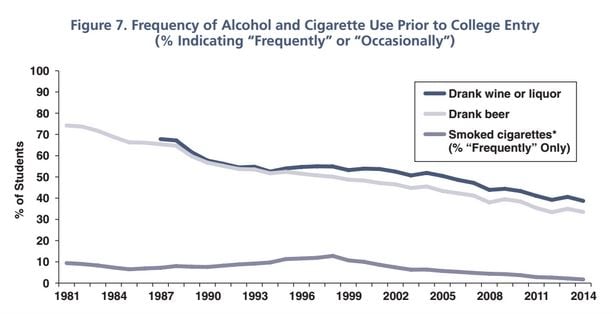You have /5 articles left.
Sign up for a free account or log in.
The emotional health of incoming freshmen is at its lowest point in at least three decades, a new survey shows, with students reporting that they're spending more time studying and less time socializing with friends.
The American Freshman Survey, an annual report that is now entering its 50th year, collected responses from about 153,000 full-time, first-year students at 227 four-year public and private institutions in 2014. When asked to rate their emotional health in relation to other people their age, only 50.7 percent of the students reported that their emotional health was "in the highest 10 percent" of people or "above average." It's the lowest rate since the survey began measuring self-ratings of emotional health in 1985.
The survey will be discussed Friday on "This Week," Inside Higher Ed's free news podcast. Sign up here to be notified of new "This Week" podcasts.
“Students who come to college feeling depressed and not emotionally well tend not to graduate,” said Kevin Eagan, director of the Cooperative Institutional Research Program at the University of California at Los Angeles, which publishes the report annually. “They’re much more likely to leave an institution, and that should be worrying.”
The mental and emotional health of students has been of increasing concern to colleges in recent years. In September, the Jed Foundation, a nonprofit organization that works to prevent suicide among college students, partnered with the Clinton Foundation Health Matters Initiative to create the Campus Program. Dozens of colleges are currently participating in the program, which is designed to help colleges and universities promote "emotional and mental well-being."
More than half of college students said they have experienced “overwhelming anxiety” in the last year, according to the American College Health Association, and 32 percent say they have felt so depressed “that it was difficult to function."
Nearly 10 percent of respondents to the 2014 freshman survey reported that they “frequently felt depressed.” It’s the highest percentage of students reporting feeling that level of depression since 1988, and 3.4 percentage points higher than in 2009, when the survey found the rate of frequently depressed freshmen to be at its lowest.
Students with disabilities reported feeling depressed even more frequently.
More than 22 percent of students on the autism spectrum or with Asperger’s syndrome reported being depressed frequently. About 17 percent of students with physical disabilities said they were frequently depressed, as did those with attention deficit/hyperactivity disorder and chronic illnesses like cancer and diabetes. Just over 15 percent of students with learning disabilities reported frequently feeling depressed.
“We certainly know that all these groups are at higher risk for emotional distress and for having troubles socially and physically,” Victor Schwartz, medical director at the Jed Foundation, said. “All of these things increase the challenge of functioning in high school and college settings. They have to work harder; they’re struggling to make friends. Schools really need to be aware as to how and if students with special needs are getting the support they need.”
Students may be feeling anxiety and depression at record rates, but they’re turning less and less to traditional college-aged mood enhancers like alcohol, the survey found.
The number of students who reported drinking alcohol during their senior year of high school has dropped to all-time low, with 38.7 percent of students saying that they frequently or occasionally drank hard liquor and wine during their senior year of high school. In 1987, nearly 70 percent of students said they'd consumed hard liquor and wine. About one-third of students in 2014 said they frequently or occasionally drank beer during their senior year. Three decades ago, about 75 percent of students admitted to doing so.
While this is not a surprising development -- drinking among high school students has seen a steady decline since the mid-1980s, when the drinking age was officially raised to 21 -- it continues to be a promising one, Eagan said. It may also be a mixed blessing.
Students are arriving on campus with much less experience drinking alcohol, but drinking is still popular among college students. According to the National Institute on Alcohol Abuse and Alcoholism, more than 60 percent of college students between the ages 18 and 22 frequently drink alcohol.
“It is a good thing that students are drinking less in high school, but from another perspective, you have to realize that this means they’re coming to campus with less experience,” Eagan said. “It’s important that colleges engage in more outreach and education, and in ways that may be different than what they’re used to.”
George Koob, director of the NIAAA, said that the decrease in drinking among incoming college freshmen has so far resulted in only a “small decline” in overall college drinking.
“And at the same time, the number of people of college age who are hospitalized for excessive drinking seems to be increasing,” Koob said. “So while fewer students are drinking, more of those who drink seem to be going to extremes. That transition from high school to college is an ideal time to educate parents and college-bound students about the risks and realities of alcohol use at college.”
Students are also spending less time partying and socializing with friends. Some of the decline may be influenced by an increase in students using social media, but Eagan said there may be another reason students are hanging out with each other less, and it’s one that “connects directly to their emotional health.”
In 2010, 65 percent of students said they studied more than 3 hours per week, with 17.5 percent of students saying they studied more than 11 hours per week. In 2014, 70 percent of students said they spent more than 3 hours studying per week, with 21.7 percent reporting that they studied more than 11 hours per week.
“We are seeing more students studying instead of socializing,” Eagan said. “That’s signaling that students are taking their senior year [of high school] more seriously. But we’re also seeing an increased proportion of students telling us that they are frequently depressed and about one-third saying they are overwhelmed by all they have to do. Students need to find a better balance with respect to academics and social life.”
Other Findings
- More than one-quarter of incoming freshmen at open-enrollment colleges and universities plan to transfer to another institution later. About 30 percent of students at the "least selective" public institutions said there is either "some" or a "very good chance" they will transfer, compared to about 11.8 percent of students at the "most selective" public institutions included in the survey.
- One-third of students said they expect that they will need more than four years to complete their degree.
- The advanced-degree aspirations of first-generation students are rising. In 1974, 41.9 percent of first-generation students said they hoped to earn a master's or doctorate degree. Now, nearly 75 percent of first-generation freshmen say they hope to earn an advanced degree, trailing other students by about 3 percentage points.
- Nearly 16 percent of students rated being admitted through an early decision program as a "very important" factor in deciding where to enroll. That's up from 6.9 percent half a decade ago.
- More than one-quarter of incoming freshmen said they do not have a religious affiliation. Nearly 15 percent of incoming freshmen at Roman Catholic colleges also reported not identifying with any religion, and 17 percent of students at other religious colleges said the same.





